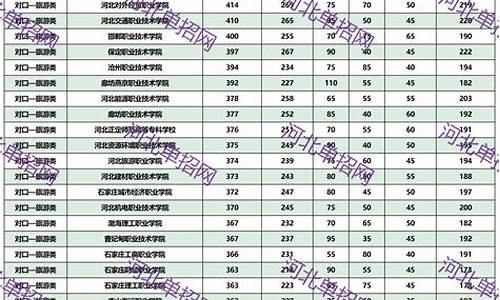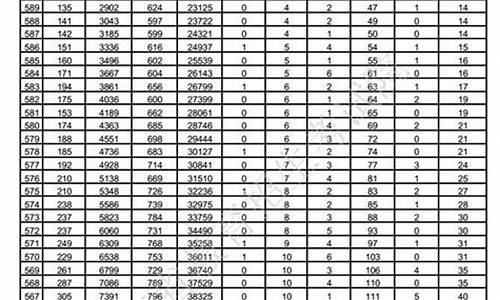您现在的位置是: 首页 > 教育新闻 教育新闻
青海2017高考答案,2017年青海高考一分一段表文科
tamoadmin 2024-05-24 人已围观
简介1.河北英语高考题2017年2.2020年青海高考状元,青海历年高考状元名单3.2017年青海高考分数线4.历年高考小说真题汇总 随着2017年高考语文科目的结束,家长和考生最想知道的无非是高考语文试题的答案,下面我为大家提供2017年北京高考语文试卷的试题和答案,供家长和学生们参考,祝愿应届高考学子取得理想的成绩。 8.请结合上述三则材料,简述让文物“活”起来的含义与作用。(6分) 答案
1.河北英语高考题2017年
2.2020年青海高考状元,青海历年高考状元名单
3.2017年青海高考分数线
4.历年高考小说真题汇总

随着2017年高考语文科目的结束,家长和考生最想知道的无非是高考语文试题的答案,下面我为大家提供2017年北京高考语文试卷的试题和答案,供家长和学生们参考,祝愿应届高考学子取得理想的成绩。
8.请结合上述三则材料,简述让文物“活”起来的含义与作用。(6分)
答案:
含义:利用博物馆,各种现代技术让参观者近距离感悟文物的魅力
作用:(1)发挥它们在公众知史爱国、鉴物审美、以及技艺传承、文化养心的作用。(2)实现学术、趣味性统一;以新鲜时尚的方式提供给观众审美与求知、娱乐与鉴赏的多元文化体验;借助计算机等生成三维环境,调动多感官带来沉浸感;使用现代技术使得文物呈现方式灵活,让更多的人喜欢上古文化(3)解决了展出空间有限、文物损毁等问题
9.下列对句中加点词的解释,不正确的一项是(3分)
A.然后属疏远 属:亲属
B.诸侯更相诛伐 更:交替
C.子房亦与焉 与:参与
D.不能易也 易:交换
此题答案为 D
10.下列各组语句中加点词的意义和用法,不同的一项是(3分)
A. 以有侯王 B. 三代之兴
争必以利 知诸侯之不可复
C. 而学士大夫多非之 D. 袭封而争位者
而诸子之论废矣 君臣父子相贼虐者
此题答案为 A
以上为2017北京高考语文试卷部分试题及答案,仅供参考。
河北英语高考题2017年
青海牧区汉族学生在西宁就读满足青海省的高考加分政策就可以加分。
青海高考加分政策
1.逐步取消的加分项目
(一)公安系统因公牺牲人民警察子女选报省内院校加分10分的项目,自2016年起,每年递减2分,2020年取消该加分项目。
(二)农牧民独生子女选报省内院校加分10分的项目,自2016年起,每年递减2分,2020年取消该加分项目。
2.继续保留的加分项目及其适用范围
(一)保留2项地方性加分项目
1.对连续在牧区(六州)工作15年以上、现仍在牧区工作的汉族干部职工子女和世居牧区的汉族群众子女,其户口在当地、从小学到高中全过程与当地少数民族学生接受同等教育条件者,加分10分投档青海2017年高考加分政策青海2017年高考加分政策。其中,在玉树州、果洛州从初中一年级起至高中毕业一直在当地就读,父母在当地工作10年以上、现仍在当地工作的汉族干部职工子女,加分20分。此项加分适用省内外所有高校。
2.对玉树州、果洛州、黄南州“民考汉”考生,小学、初中、高中全过程一直在当地就读、与当地的汉族学生接受了同类教育、参加了同类试题的高考,选报省内院校的,在享受原照顾加分条件的基础上,加分10分投档。
(二)保留5项国家加分项目
1.烈士子女,加分20分投档。
2.归侨、归侨子女、华侨子女、台湾省籍考生,加分10分投档
3.自谋职业的退役士兵,加分10分投档。
4.在服役期间荣立二等功以上或被大军区以上单位授予荣誉称号的退役军人,加分20分投档青海2017年高考加分政策普通高考。
5.少数民族考生在向省内外院校投档时,加分20分。其中在向全国省属院校投档时,再给六州少数民族考生加分15分,累计为35分。
以上加分项目及分值,如同一考生符合多项加分条件的,除特殊规定外,只取其中幅度最大的一项分值,不累加。
2020年青海高考状元,青海历年高考状元名单
许多在眼前看来天大的事,都不是人生一战,而只是人生一站。确实高考备战让你们很辛苦,可是已经坚持了这么久,这就已经是胜利。祝高考成功!下面是我为大家推荐的河北英语高考题2017年,仅供大家参考!
河北英语高考题2017年第I卷
注意事项:
1.答第I卷前,考生务必将自己的姓名、准考证号填写在答题卡上
2.选出每小题答案后,用2B铅笔把答题卡上对应题目的答案标号涂黑。如需改动,用橡皮擦干净后,再选涂其他答案标号。不能答在本试卷上,否则无效
第一部分听力(共两节,满分30分)
做题时,先将答案标在试卷上,录音内容结束后,你将有两分钟的时间将试卷上的答案转涂到答题卡上
第一节(共5小题;每小题1.5分,满分7.5分)
听下面5段对话。每段对话后有一个小题,从题中所给的A、B、C三个选项中选出最佳选项,并标在试卷的相应位置。听完每段对话后,你都有10秒钟的时间来回答有关小题和阅读下一小题题。每段对话仅读一遍。
例:How much is the shirt?
A.£19.15. B.£9.18. C.£9.15.
答案是C。
1. Where is Mary?
A. In the classroom. B. In the library. C. On the playground.
2. How much should the man pay for the tickets?
A. $16. B. $12. C. $6
3. Why can?t the woman give the man some help?
A. She is quite busy now.
B. She doesn?t like grammar.
C. She is poor in grammar,too.
4. What happened to Marx?
A. He lost his way.
B. He found his bike missing.
C. He lost his wallet.
5. Why did the man fail to attend the party?
A. He forgot it.
B. He didn?t know about the party.
C. He wasn?t invited to the party.
第二节(共15小题;每小题1.5分,满分22.5分)
听下面5段对话或独白。每段对话或独白后有几个小题,从题中所给的A、B、C三个选项中选出最佳选项,并标在试卷的相应位置。听每段对话或独白前,你将有时间阅读各个小题,每小题5秒钟;听完后,各小题将给出5秒钟的作答时间。每段对话或独白读两遍。
听第6段材料,回答第6、7题。
6. Why must the man drive to work?
A. It is the quickest way.
B. He has to use his car after work.
C. He lives too far from the subway.
7. What?s the relationship between the speakers?
A. Boss and employee.
B. Grandmother and grandson.
C. Teacher and student.
听第7段材料,回答第8~9题。
8. When is Alice?s birthday?
A. Tomorrow. B. The day after tomorrow. C. Today.
9. What will the two speakers buy for Alice?
A. A recorder. B. Some flowers. C. A box of chocolates.
听第8段材料,回答第10~12题。
10. What does the woman do in the group?
A. Play the piano. B. Play the violin. C. Sing for the group.
11. Who is Miss Pearson?
A. Leader of the group.B. Director of the group. C. Teacher of the group.
12. How often does the group meet?
A. Once a week. B. Twice a week. C. Every third week.
听第9段材料,回答第13~16题。
13. Who possibly is the woman?
A. An air hostess. B. A native Indian. C. A travel agent.
14. How long does the trip last?
A. Seven days. B. Eight days. C. Nine days.
15. What will the man probably do at the second stage?
A. Do some shopping. B. Visit the Taj Mabal. C. See wild animals.
16. What will the speakers do next?
A. Say goodbye to each other.B. Find out the price. C. Go to India by air.
听第10段材料,回答第17~20题。
17. In what way does Jack like to travel?
A. With a lot of people.
B. With one or two good friends.
C. All by himself.
18. What does Helen prefer on holiday?
A. Staying at home.
B. Seeing famous places.
C. Enjoying nature quietly.
19. What does Bob like the best about travel?
A. Making more friends. B. Buying what he wants. C. Seeing and learning.
20. Who prefers to do shopping while traveling?
A. Jack. B. Helen. C. Bob.
第二部分阅读理解(共两节,满分40分)
第一节(共15小题;每小题2分,满分30分)
阅读下列短文,从每题所给的四个选项(A、B、C和D)中,选出最佳选项,并在答题卡上将该项涂黑。
A
We have designed all our bank cards to make your life easier.
Using your NatWest Service Card
As a Switch card, it lets you pay for all sorts of goods and services, whenever you see the Switch logo. The money comes straight out of your account, so you can spend as much as you like as long as you have enough money (or an agreed overdraft (透支) to cover it). It is also a cheque guarantee card for up to the amount shown on the card. And it gives you free access to your money from over 31,000 cash machines across the UK.
Using your NatWest Cash Card
You can use your Cash Card as a Solo card to pay for goods and services wherever you see the Solo logo. It can also give you access to your account and your cash from over 31,000 cash machines nationwide. You can spend or withdraw what you have in your account, or as much as your agreed overdraft limit.
Using your cards abroad
You can also use your Service Card and Cash Card when you?re abroad. You can withdraw cash at cash machines and pay for goods and services wherever you see the Cirrus or Maestro logo displayed.
We take a commission charge (手续费) of 2.25% of each cash withdrawal you make (up to£4) and a commission charge of 75 pence every time you use Maestro to pay for goods or services. We also apply a foreign-exchange transaction fee of 2.65%.
Using your NatWest Credit Card
With your credit card you can do the following:
* Pay for goods and services and enjoy up to 56 days? interest-free credit.
* Pay in over 24 million shops worldwide that display the MasterCard or Visa logos.
* Collect one AIR MILE for every£20 of spending that appears on your statement (结算单). (This does not include foreign currency or traveler?s cheques bought, interest and other charges.)
21. If you carry the Service Card or the Cash Card, ________.
A. you can use it to guarantee things as you wish
B. you can draw your money from cash machines conveniently
C. you can spend as much money as you like without a limit
D. you have to pay some extra money when you pay for services in the UK
22. If you withdraw£200 from a cash machine abroad, you will be charged ________.
A. £4 B. £4.5 C. £5.25 D. £5.3
23. Which of the following is TRUE about using your NatWest Credit Card?
A. You have to pay back with interest within 56 days.
B. You can use the card in any shop across the world.
C. You will be charged some interest beyond two months.
D. You will gain one air mile if you spend £20 on traveller?s cheques.
24. The purpose of the passage is to show you how to ________.
A. pay for goods with your cards B. use your cards abroad
C. draw cash with your cards D. play your cards right
B
Once when I was facing a decision that involved high risk, I went to a friend. He looked at me for a moment, and then wrote a sentence containing the best advice I?ve ever had: Be bold and brave ? and mighty (强大的) forces will come to your aid.
Those words made me see clearly that when I had fallen short in the past, it was seldom because I had tried and failed. It was usually because I had let fear of failure stop me from trying at all. On the other hand, whenever I had plunged into deep water, forced by courage or circumstance, I had always been able to swim until I got my feet on the ground again.
Boldness means a decision to bite off more than you can eat. And there is nothing mysterious about the mighty forces. They are potential powers we possess: energy, skill, sound judgment, creative ideas ? even physical strength greater than most of us realize.
Admittedly, those mighty forces are spiritual ones. But they are more important than physical ones. A college classmate of mine, Tim, was an excellent football player, even though he weighed much less than the average player. ?In one game I suddenly found myself confronting a huge player, who had nothing but me between him and our goal line,? said Tim. ?I was so frightened that I closed my eyes and desperately threw myself at that guy like a bullet ? and stopped him cold.?
Boldness ? a willingness to extend yourself to the extreme?is not one that can be acquired overnight. But it can be taught to children and developed in adults. Confidence builds up. Surely, there will be setbacks (挫折) and disappointments in life; boldness in itself is no guarantee of success. But the person who tries to do something and fails is a lot better off than the person who tries to do nothing and succeeds.
So, always try to live a little bit beyond your abilities?and you?ll find your abilities are greater than you ever dreamed.
25. Why was the author sometimes unable to reach his goal in the past?
A. He faced huge risks. B. He lacked mighty forces.
C. Fear prevented him from trying. D. Failure blocked his way to success.
26. What is the implied meaning of the underlined part?
A. Swallow more than you can digest. B. Act slightly above your abilities.
C. Develop more mysterious powers. D. Learn to make creative decisions.
27. What can be learned from Paragraph 5?
A. Confidence grows more rapidly in adults. B. Trying without success is meaningless.
C. Repeated failure creates a better life. D. Boldness can be gained little by little.
C
The wallet is heading for extinction. As a day-to-day essential, it will die off with the generation who read print newspapers. The kind of shopping-where you hand over notes and count out change in return?now happens only in the most minor of our retail encounters,like buying a bar of chocolate or a pint of milk from a corner shop. At the shops where you spend any real money, that money is increasingly abstracted. And this is more and more true, the higher up the scale you go. At the most cutting-edge retail stores?Victoria Beckham on Dover Street, for instance?you don't go and stand at any kind of cash register when you decide to pay. The staff are equipped with iPads to take your payment while you relax on a sofa.
Which is nothing more or less than excellent service, if you have the money. But across society, the abstraction(抽象) of the idea of cash makes me uneasy. Maybe I'm just old-fashioned. But earning money isn't quick or easy for most of us. Isn't it a bit incredible that spending it should happen in half a blink(眨眼)of an eye? Doesn't a wallet?that time-honoured Friday-night feeling of pleasing, promising fatness?represent something that matters?
But I'll leave the economics to the experts. What bothers me about the death of the wallet is the change it represents in our physical environment. Everything about the look and feel of a wallet?the way the fastenings and materials wear and tear and loosen with age, the plastic and paper and gold and silver, and handwritten phone numbers and printed cinema tickets?is the very opposite of what our world is becoming. The opposite of a wallet is a smartphone or an iPad. The rounded edges, cool glass, smooth and unknowable as pebble(鹅卵石). Instead of digging through pieces of paper and peering into corners, we move our fingers left and right. No more counting out coins. Show your wallet, if you still have one. It may not be here much longer.
28. What is happening to the wallet?
A. It is disappearing. B. It is being fattened.
C. It is becoming costly. D. It is changing in style.
29. What makes the author feel uncomfortable nowadays?
A. Saving money is becoming a thing of the past.
B. The pleasing Friday-night feeling is fading.
C. Earning money is getting more difficult.
D. Spending money is so fast and easy.
30. Why does the author choose to write about what's happening to the wallet?
A. It represents a change in the modern world.
B. It has something to do with everybody's life.
C. It marks the end of a time-honoured tradition.
D. It is the concern of contemporary economists.
31. What can we infer from the passage about the author?
A. He is resistant to social changes.
B. He is against technological progress.
C. He feels reluctant to part with the traditional wallet.
D. He feels insecure in the ever-changing modern world.
2017年青海高考分数线
一、2017年青海高考状元名单公布 青海高考状元出炉!马文子同学以650分获得青海高考文科状元!
马文子说,虽然她并没有特别强的科目,不过也从来不偏科。想要考出好成绩,即便是不太擅长的科目也不要放弃,同时更要讲究学习方法。活用错题本就是方法之一。
马文子把每次考试的错题都会在老师讲解前抄在错题本上,等老师讲完了她也并不急于把答案抄在上面,而是尽可能听懂老师的讲解。等隔一段时间,就把错题本拿出来将上次老师讲过的错题再做一遍。
青海高考状元出炉!张磊同学以709分获得青海高考理科状元!
回顾紧张繁忙的高中学习经历,张磊认为,专时专用最重要,“这样可以做到均衡分配学习时间,从而提高学习效率。”张磊说,学习最怕没有计划,在自己规定的时段做该做的事,并且心无杂念,这种专时专用并不是刻意地将时间分割,前提是要对自己的学习情况、学习状态有所掌握,有的放矢,才能打硬仗。
在家里,张磊可以不用偷偷摸摸上网,也不用经过父母允许才能上网,能得到这样的“待遇”,与张磊自控能力极强有关。
张磊自认是追求完美的人,体现在学习上,就是做事要有始有终,并且要做到最好。他举例说:“我最喜欢数学,除了课堂知识外,我希望能通过自己的探究来深入这门学科。比如在学习卡方统计量时,老师只是将检验公式告诉同学们,让大家遇到此类题型套公式就可以。我在熟练掌握计算方式之后,就开始琢磨公式背后的原理是什么。这时,我一般都是先自己钻研,如果钻研不透,会找同学们交流,或者记入一个笔记本里,待有空时继续探究。”张磊所说的那个笔记本里,除了记录下了许多这样的问题之外,还记下了他平时思考后的灵感小火花,甚至一些稀奇古怪的问题。
,我省高考成绩一本线文史类比2013年高出38分,理工类比2013年高出23分,双双创下自2009年以来的一本线最高纪录。这也说明,我省各中学无论是教育教学质量,还是对高考试题的把握水平正在逐年提升。
今年高考结束后,根据西宁二中名师试卷难易度分析以及网上阅卷老师点评结果显示,今年高考试卷难易度与往年持平,有些科目难于往年,学生不易把握。尤其是物理有相当的难度。
二、2018年青海高考状元名单公布
理科状元:武家和,青海湟川中学,裸分699分,加20分后总分719分。
三、青海高考状元名单公布
暂无公布
四、2020年青海高考状元是谁
2020年青海高考状元名单即将公布,请关注本页面,我们稍后更新!考生可以登录聚志愿网站查询自己的成绩排名及所在的成绩位次可以上哪些大学。
2020年青海知分选大学系统: ;
历年高考小说真题汇总
2017年青海高考分数线分为文史类、理工类和藏汉双语类,具体分数线如下:
文史类:
第一批本科:普通班463分;面向贫困地区定向招生专项计划443分;省外院校民族班、民族预科453分。
第二批本科:普通班421分;面向贫困地区定向招生专项计划411分;省外院校民族班、民族预科411分。省内院校本科民族预科:406分。
第三批本科:普通班382分;省外院校民族预科382分。专科(含专科层次民族班):200分。
理工类:
第一批本科:普通班391分;面向贫困地区定向招生专项计划371分;省外院校民族班、民族预科381分。
第二批本科:普通班356分;面向贫困地区定向招生专项计划346分;省外院校民族班、民族预科346分。省内院校本科民族预科:341分。
第三批本科:普通班328分;省外院校民族预科328分。专科(含专科层次民族班):200分。
藏汉双语类:
藏汉双语文科:本科460分;省内院校本科预科448分;专科443分。
藏汉双语理科:本科380分;省内院校本科预科353分;专科348分。
以上数据出自中国教育网。
高考报名条件:
(一)符合下列条件的人员,可以申请报名:
1、遵守中华人民共和国宪法和法律。
2、高级中等教育学校(含中等职业学校)毕业或具有同等学力(初级中学毕业满3年且参加了省高中学业水平考试)。
3、符合本通知附件所列在省参加普通高考的相关户籍、学籍等管理要求。
4、身体状况符合相关要求。
(二)根据教育部和省相关规定,下列人员不得报名:
1、具有高等学历教育资格的高校在校生(省内院校专升本除外),或已被高等学校录取并保留入学资格的学生。
2、高级中等教育学校(含中等职业学校)非应届毕业的在校生(报考少年班的除外)。
3、在高级中等教育(含中等职业教育)阶段非应届毕业年份以弄虚作假手段报名并违规参加普通高校招生考试的应届毕业生。
4、因违反国家教育考试规定,被给予暂停参加高校招生考试处理且在停考期内的考生。
5、因触犯刑法已被有关部门采取强制措施或正在服刑者。
6、不符合本通知附件所列在省参加普通高考相关户籍、学籍等管理要求的考生。
高考语文中,小说阅读是必考的一部分。小说阅读不仅考察考生的阅读能力和理解能力,还考察考生的文学素养和人文素养。为了帮助大家更好地备战高考语文小说阅读部分,本文将为大家汇总历年高考小说真题,并提供相应的操作步骤。
2019年高考小说真题
题目:阅读下面这篇小说,回答问题。
“我”是一个小学四年级的学生,家住在乡下。那时候,我最喜欢的事情就是在爷爷家的稻田里捉青蛙。我和爷爷一起,手里拿着一个网,蹲在稻田里,等待着青蛙的出现。
有一天,我和爷爷在稻田里抓青蛙,突然看到一个小女孩,她在稻田里玩耍。小女孩看到我们,就跑过来问我们在干什么。我和爷爷告诉她我们在抓青蛙,小女孩也很兴奋,想和我们一起抓青蛙。于是,我们三个人一起在稻田里捉青蛙,度过了一个愉快的下午。
问题:
1.“我”最喜欢的事情是什么?
2.“我”和爷爷在稻田里干什么?
3.小女孩看到我们在干什么后,想做什么?
4.故事发生在什么地方?
操作步骤:
1.仔细阅读题目中的小说,理解故事情节。
2.根据问题,有针对性地再次阅读小说,找到问题的答案。
3.在答题卡上填写相应的答案。
2018年高考小说真题
题目:阅读下面这篇小说,回答问题。
我和奶奶住在一个小村庄里。奶奶是一个非常勤劳的人,每天早上都会起得很早,去田里干活。我和奶奶一起吃早饭,然后奶奶就去田里了。
有一天,我在家里看电视,突然听到奶奶在田里大声呼救。我赶紧跑出去,看到奶奶被一只大母猪追着咬。我非常害怕,但是我知道我必须救奶奶。于是,我拿起手中的扫帚,冲向大母猪。大母猪见我来了,立刻停了下来,然后逃跑了。
问题:
1.故事发生在哪里?
2.奶奶每天早上都会去哪里?
3.为什么奶奶在田里呼救?
4.为什么大母猪会追着咬奶奶?
操作步骤:
1.仔细阅读题目中的小说,理解故事情节。
2.根据问题,有针对性地再次阅读小说,找到问题的答案。
3.在答题卡上填写相应的答案。
2017年高考小说真题
题目:阅读下面这篇小说,回答问题。
我和妈妈住在一起,妈妈是一个很忙的人,经常加班到很晚。我每天都会等妈妈回来,然后一起吃晚饭。有一天,妈妈加班到很晚,我等了很久也没有等到她。我开始担心妈妈出了什么事情,于是打电话给她,但是电话一直没有人接。我越来越害怕,不知道该怎么办。
突然,我听到门外有人敲门,我赶紧跑去开门。是一个陌生人,他问我是不是“XX”的孩子,我点了点头。他告诉我,他是妈妈的同事,妈妈加班到很晚了,他过来接我回家。我非常感激他,跟着他回家了。
问题:
1.我和谁住在一起?
2.妈妈是一个什么样的人?
3.为什么我开始担心妈妈?
4.我是怎么回家的?
操作步骤:
1.仔细阅读题目中的小说,理解故事情节。
2.根据问题,有针对性地再次阅读小说,找到问题的答案。
3.在答题卡上填写相应的答案。
结尾
以上是历年高考小说真题的汇总,通过做题,可以帮助我们更好地理解小说,提高阅读和理解能力。在备战高考时,我们可以多做一些小说阅读的练习,提高自己的文学素养和人文素养。









